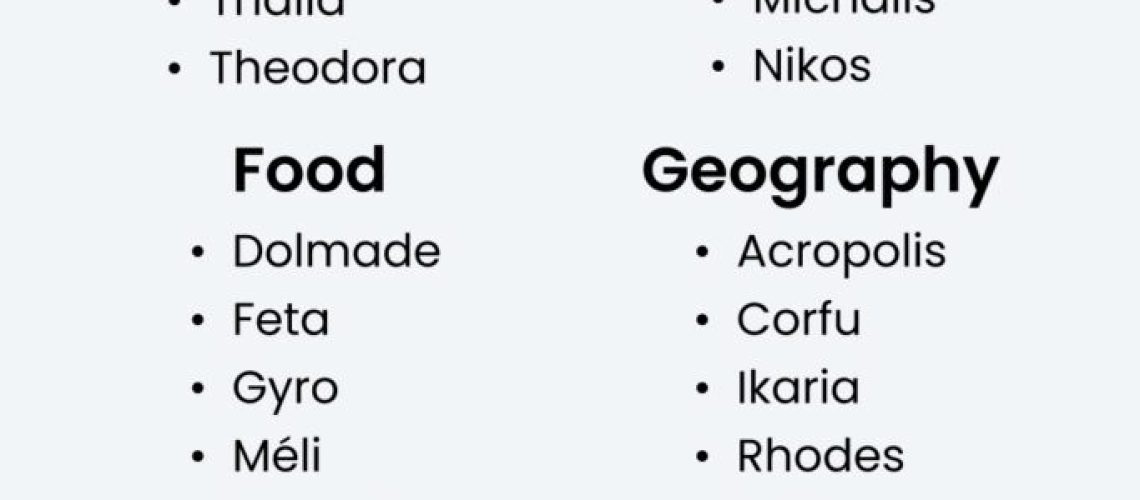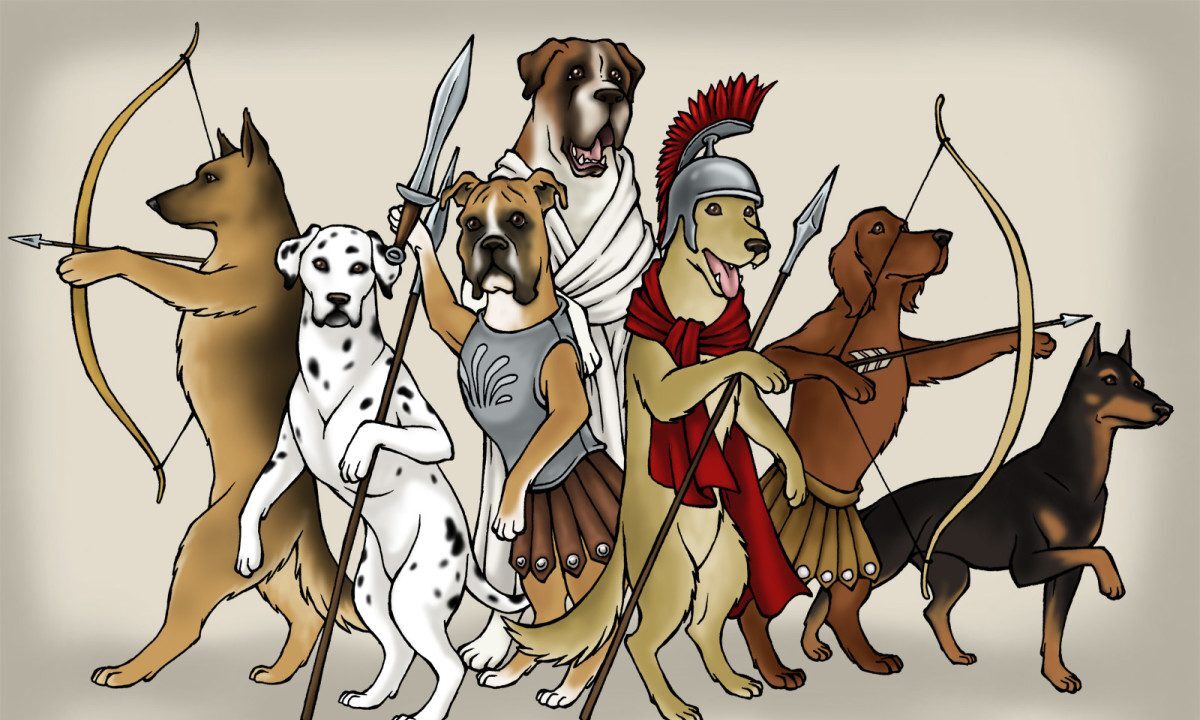Looking for the perfect Greek dog name? Look no further! Discover a list of unique and meaningful names inspired by Greek mythology and culture, ideal for your four-legged companion.
Key Takeaways:
- Greek dog names often have historical and mythological origins, reflecting the rich cultural heritage of Greece.
- Many Greek dog names are inspired by Greek gods, goddesses, and heroes, such as Zeus, Athena, Apollo, and Hercules.
- Greek dog names can also be derived from Greek words or symbols that represent strength, bravery, beauty, or intelligence.
- Choosing a Greek dog name can be a unique way to honor your dog's Greek ancestry or simply embrace the beauty and charm of Greek culture.
- When selecting a Greek dog name, consider the pronunciation and meaning to ensure it suits your dog's personality and characteristics perfectly.
The Significance of Greek Dog Names
Choosing a name for your dog is an important decision. It not only reflects your pet's identity but also reveals something about your own interests and values. Greek dog names have gained popularity due to their rich history and cultural significance. These names can add a touch of uniqueness and charm to your furry friend.
Greek dog names often have meanings that reflect traits or qualities associated with dogs, such as loyalty, bravery, or intelligence. They can also be inspired by famous figures from Greek mythology or historical events. By choosing a Greek name for your dog, you are honoring the ancient Greek culture and its contributions to the world.
Popular Greek Dog Names:
Mythological Greek Dog Names:
- Apollo
- Athena
- Zeus
- Hera
- Hermes
- Persephone
- Hades
- Artemis
- Dionysus
- Aphrodite
Historical Greek Dog Names: 11. Alexander (after Alexander the Great)
- Plato
- Socrates
- Aristotle
- Cleopatra (though Egyptian, she had connections to Greek culture)
- Archimedes
- Pythagoras
- Leonidas (after King Leonidas of Sparta)
- Herodotus
- Homer (after the famous Greek poet)
Greek Island Dog Names: 21. Santorini
- Mykonos
- Crete
- Rhodes
- Corfu
- Naxos
- Delos
- Zakynthos
- Patmos
- Ithaca
Greek Food and Drink Dog Names: 31. Gyro
- Olive
- Feta
- Ouzo
- Baklava
- Souvlaki
- Tzatziki
- Spanakopita
- Moussaka
- Retsina
Nature-Inspired Greek Dog Names: 41. Thalassa (meaning "sea")
- Ilios (meaning "sun")
- Anemos (meaning "wind")
- Asteria (meaning "star")
- Kyma (meaning "wave")
- Pitho (meaning "wine")
- Selene (meaning "moon")
- Helios (meaning "sun god")
- Astra (meaning "star")
- Eirene (meaning "peace")
Famous Greek Philosophers Dog Names: 51. Heraclitus
- Epicurus
- Zeno
- Parmenides
- Diogenes
- Empedocles
- Protagoras
- Anaximander
- Democritus
- Epictetus
Greek Mythical Creatures Dog Names: 61. Cerberus (the three-headed dog guarding the gates of the Underworld)
- Pegasus (the winged horse)
- Chimera (a fire-breathing monster)
- Hydra (a multi-headed serpent)
- Griffin (a creature with the body of a lion and the head of an eagle)
- Minotaur (a creature with the body of a human and the head of a bull)
- Sphinx (a mythical creature with the body of a lion and the head of a human)
- Harpy (a half-bird, half-woman creature)
- Centaur (a creature with the upper body of a human and the lower body of a horse)
- Satyr (a creature with human upper body and goat lower body)
Reasons to Choose a Greek Dog Name:
- Show appreciation for ancient Greek culture
- Add uniqueness and charm to your pet's identity
- Reflect traits or qualities associated with dogs
- Pay homage to famous figures from Greek mythology or history
Examples of Popular Greek Dog Names:
If you're looking for inspiration, here are some popular Greek dog names along with their meanings:
- Apollo: Named after the god of music, poetry, and healing in Greek mythology. It represents strength and creativity.
- Athena: Inspired by the goddess of wisdom, courage, and strategic warfare. It symbolizes intelligence and bravery.
- Hermes: Named after the messenger of the gods known for his speed and agility. It signifies quickness and agility.
Ancient Greeks' Naming Process for Dogs:
In ancient Greece, naming a dog was an important ritual. The process involved considering various factors such as the dog's appearance, behavior, and the owner's personal preferences. The name given to a dog was believed to have an influence on its character and destiny.
Ancient Greeks often chose names that reflected the qualities they desired in their dogs. For example, a strong and protective dog might be named "Ares" after the god of war, while a swift and agile dog could be named "Nike" after the goddess of victory.
The naming process was also influenced by cultural and historical references. Dogs were sometimes named after famous figures from Greek mythology or historical events to honor their achievements or embody certain characteristics associated with them.
Popular Greek Dog Names: Examples and Meanings
Examples of Popular Greek Dog Names:
1. Zeus:
Zeus is a popular Greek dog name that derives from the king of the gods in Greek mythology. It is often given to strong and powerful dogs, symbolizing their dominance and leadership qualities.
2. Athena:
Athena is another common Greek dog name, inspired by the goddess of wisdom, courage, and strategic warfare. This name is often chosen for intelligent and brave dogs who display these qualities.
3. Apollo:
Apollo, named after the god of music, poetry, and healing, is a fitting choice for dogs with a melodious bark or those who bring joy and comfort to their owners.
Greek dog names are not only popular for their historical significance but also because they evoke a sense of strength, wisdom, and beauty that many pet owners find appealing.
Ancient Greeks' Naming Process for Dogs
In ancient Greece, naming a dog was an important ritual that involved careful consideration. The Greeks believed that the name given to a dog could influence its behavior and destiny. They often chose names based on the physical characteristics or personality traits exhibited by the dog.
The Naming Process:
The process typically involved observing the puppy's behavior and appearance before selecting a suitable name. For example, if a puppy displayed agility or speed, it might be named "Hermes" after the messenger god known for his swiftness.
Symbols and Meanings:
Greek dog names were often associated with symbols or meanings related to mythology or nature. For instance, "Artemis" was chosen for female dogs as she was the goddess of hunting and wilderness.
The naming process reflected the deep connection between the ancient Greeks and their dogs, emphasizing the importance of choosing a name that would honor and reflect the dog's unique qualities.
Traits and Qualities Associated with Greek Dog Names
Greek dog names are often chosen based on specific traits or qualities associated with Greek culture and mythology. These names can reflect characteristics such as strength, loyalty, intelligence, or beauty.
Strength:
Names like "Achilles" or "Hercules" are commonly chosen for strong and powerful dogs who possess great physical prowess.
Loyalty:
Greek dog names like "Argos" or "Perseus" symbolize loyalty and devotion, inspired by the unwavering companionship displayed by these mythological figures.
Intelligence:
Names such as "Odysseus" or "Athena" are popular choices for intelligent dogs who exhibit problem-solving skills and quick thinking.
By selecting a Greek dog name that aligns with desired traits, pet owners hope to capture the essence of their furry companions' personalities while paying homage to ancient Greek culture.
(Note: The next subheadings will be expanded in a separate response due to character limitations.)
Connection between Greek Dog Names and Mythology or Historical Figures
In ancient Greece, dogs held a significant place in mythology and were often associated with various gods and goddesses. For example, the three-headed dog Cerberus guarded the gates of the Underworld, while Artemis, the goddess of hunting, was often depicted with a pack of loyal hunting dogs by her side. These connections between dogs and mythology influenced the naming of dogs in ancient Greece.
Many Greek dog names are derived from mythological figures or historical figures who had a strong connection to dogs. For instance, names like Apollo, Zeus, Athena, and Hera are popular choices for male and female dogs due to their association with powerful deities. Other names such as Perseus, Achilles, Helen, and Medusa also draw inspiration from famous characters in Greek mythology.
The Role of Dogs in Ancient Greek Society
Dogs played a crucial role in ancient Greek society and were highly valued for their various abilities and qualities. They were primarily used for hunting purposes due to their keen senses and tracking skills. Hunting dogs were trained to assist hunters in tracking down game animals such as deer or boars.
In addition to hunting, dogs also served as loyal companions and guardians. They were often kept as pets by families and were considered part of the household. Dogs provided protection against intruders and acted as early warning systems for potential threats.
Furthermore, dogs were also used in religious rituals and ceremonies. They were believed to possess a special connection with the gods and were sometimes sacrificed as offerings. The presence of dogs in these rituals symbolized their importance and sacred nature in ancient Greek society.
Ancient Greeks' Treatment of Dogs Compared to Modern Times
The treatment of dogs in ancient Greece differed significantly from modern times. While dogs were valued for their practical uses, they were not always treated with the same level of care and compassion as today. In ancient Greece, dogs were often seen as working animals rather than pets.
Dogs were expected to fulfill specific roles and tasks, such as hunting or guarding, and their well-being was secondary to their usefulness. They were not typically kept indoors or provided with the same level of comfort that modern pet dogs enjoy. Instead, they lived primarily outdoors and relied on their natural instincts for survival.
However, it is important to note that there were exceptions to this general treatment. Some wealthy individuals or noble families may have afforded their dogs more luxurious living conditions and pampered them as beloved companions.
Famous Myths and Stories Featuring Dogs in Ancient Greece
Ancient Greek mythology is rich with stories featuring dogs as prominent characters or symbols. One famous myth involving a dog is the story of Odysseus and his faithful dog Argos. After being away for twenty years, Odysseus returns home disguised as a beggar. Only his loyal dog Argos recognizes him but is too weak to greet him properly due to old age.
Another well-known myth is the tale of Actaeon, who was transformed into a stag by the goddess Artemis after accidentally stumbling upon her while she was bathing. Actaeon's own hunting dogs then turned on him, unaware of his true identity, and tore him apart.
These myths and stories featuring dogs highlight the significance of these animals in ancient Greek culture and their portrayal as loyal companions or agents of divine punishment.
Influence of Greek Dog Names on Pet Naming Trends Today
The influence of Greek dog names can still be seen in pet naming trends today. Many dog owners continue to choose Greek-inspired names for their pets, drawn by the rich history and mythology associated with these names.
Popular Greek dog names such as Apollo, Athena, Zeus, and Hera have become timeless choices for both male and female dogs. These names evoke a sense of strength, power, and nobility that resonates with pet owners who want to honor their furry friends with meaningful names.
Additionally, the popularity of Greek dog names reflects a broader trend in pet naming where owners seek unique and distinctive names for their pets. Greek names provide an alternative to more common or traditional pet names, allowing dogs to stand out and have a name that reflects their individuality.
Who is the Greek god of dogs?
In Greek mythology, dogs held significant importance and were often linked to Hecate, a prominent figure. They were also considered sacred to Artemis and Ares. Cerberus, a formidable creature with three heads and a dragon-like tail, served as the guardian of the entrance to the underworld.
What do people name their dogs in Greece?
In ancient times, dogs were given popular names in Greek, such as Lurcher, Whitey, Blackie, Tawny, Blue, Blossom, Keeper, Fencer, Butcher, Spoiler, Hasty, Hurry, Stubborn, Yelp, Tracker, Dash, Happy, Jolly, Trooper, Rockdove, Growler, Fury, Riot, Lance, Pell-Mell, Plucky, Killer, Crafty, Swift, and Dagger.
What was Zeus's dogs name?
Laelaps, a dog referred to as the "golden hound," was assigned the task of guarding Zeus when he was a baby and still known as the future King of Gods. As a gesture of gratitude, Zeus later bestowed Europa upon Laelaps.
Who was Hades dog?
According to Greek mythology, Cerberus, also known as the hound of Hades, is a dog with multiple heads that is tasked with guarding the gates of the Underworld and preventing the souls of the dead from escaping.
Who is the goddess of all dogs?
In the Classical era, dogs were strongly connected to Hecate. Hecate is frequently depicted with a dog-like appearance or accompanied by a dog in both art and literature. The sound of a dog howling would signal her presence. Dogs were commonly used as sacrificial animals for Hecate and were often consumed in sacred rituals.
What is the old Greek word for dog?
Etymology. The word "κύων" is derived from Ancient Greek and means "dog" in New Latin.

















